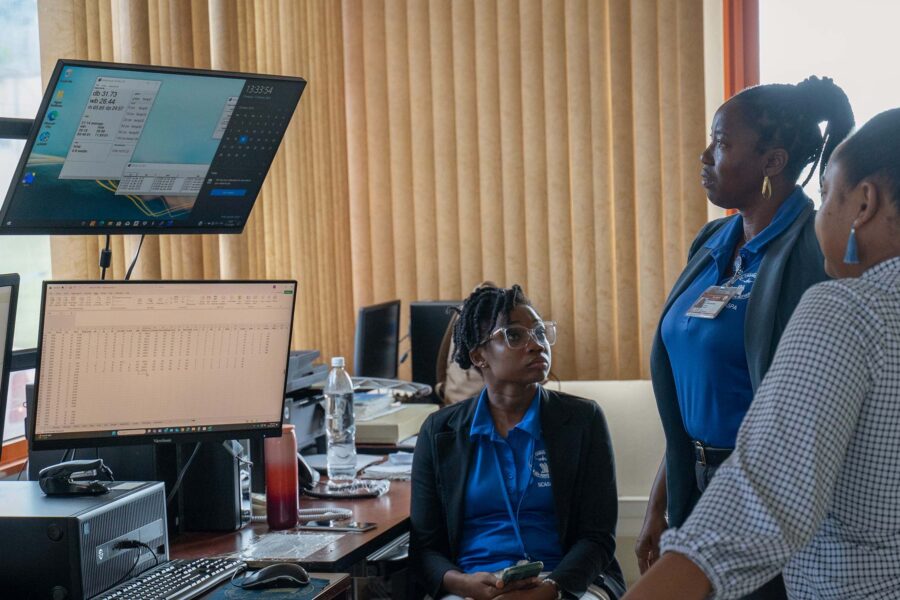Don’t believe the disinformation: the UN makes America stronger
The UN and the USA need each other. A failure to recognize the benefits that the USA receives has led to a push to defund the UN – the consequences would be detrimental to everyone
Global governance — Global, US and Canada

There’s hardly an aspect of the daily activities of Americans that isn’t influenced by our engagement with the United Nations and its agencies, agreements, and ancillary bodies.
Partnership between the UN’s International Civil Aviation Organization and the Federal Aviation Administration, for example, ensures safe travel for the 2.8 million passengers who fly US airlines every day. The UN’s Office of Drugs and Crime works alongside the FBI to safeguard Americans from the influx of synthetic drugs like fentanyl. Even the UN’s United Postal Union is a key player in setting standards used by the US Postal Service to deliver mail worldwide, including election ballots for American military personnel abroad. What’s more, the UN works with US businesses for the goods and services necessary to fulfill these tasks – providing more in contracts to US companies than American taxpayers pay in annual dues to the institution. These procurement dollars equate to tens of thousands of jobs nationwide, on top of the 6,000 US employees of the UN in New York City alone.
This body of benefits and basic services delivered by the UN to Americans is the lesser known story of the organization, tending to get lost in the bigger headlines of wars, pandemics, and bold initiatives reflected in the Sustainable Development Goals (SDGs).
Unfortunately, because the silent work of the UN is neither well known nor well understood, a growing number of Americans are vocalizing distrust for the institution and questioning the value of America’s engagement. This, in turn, has resulted in Congressional attacks on the UN and first-in-history calls to pull core funding from the organization that we shepherded into existence. Should these defunding threats materialize, it’s no exaggeration to say that America’s ability to work effectively both at home and abroad would be profoundly compromised. It would also thwart the UN’s ability to maintain international peace and security. Indeed, the global ecosystem would be at risk.
The danger of disinformation
At the heart of this rising tide of anti-UN sentiment rests the growing peril of misinformation and disinformation. There’s no question that misinformation born of misunderstanding is not new. The intricacies of the world’s largest intergovernmental institution are vast, woven together through thousands of agreements, pacts, and promises that span 193 Member States and 80 years of history. That Americans are largely unaware of the reach and coordination of the UN is unsurprising.
What is troublingly new is the speed and ferocity of disinformation wars being intentionally waged, arguably posing the most significant threat to the global system since the early 19th century. A recent UNESCO survey found that more than 85% of people worldwide are worried about the impact of disinformation, with 87% believing it has harmed their country’s political system. Even more concerning is that the proliferation in disinformation comes at a time when fewer and fewer impartial spaces exist – especially in the echo chamber of algorithm-curated social feeds – to allay those fears with facts. It’s for this reason that the UN issued Global Principles for Information Integrity to help provide guidance on fighting the fake.
At the United Nations Association of the USA (UNA-USA), a program of the UN Foundation we too are committed to dispelling disinformation. With the stakes higher than ever, it’s critical we confront the falsehoods surrounding US engagement with the UN, especially as the organization seeks to reignite global commitments around the SDGs during the upcoming and much-anticipated Summit of the Future. In our own work, we’ve seen the power of an informed public to remind our fellow citizens that American prosperity relies on a strong global infrastructure – and the world relies on US support of the UN to maintain that order.
Fact: American values are global values
Among the most prevailing fabrications asserted by UN opponents is the claim that the UN does not represent American values and that the SDGs embody that contradiction. In reality, it was American Eleanor Roosevelt who spearheaded the most enduring global commitment to shared values and human progress penned in modern history: the UN’s Universal Declaration of Human Rights (UDHR). That declaration has served as a foundation for the SDGs.
The principles codified in the UDHR continue to evolve with American participation – most recently through action from UNA-USA to augment the UDHR with the first Youth Declaration of Human Rights. Under the leadership of two UNA-USA Youth Observers to the UN, the declaration was the culmination of a year-long process of debate and drafting, with the participation of hundreds of young people across the US exploring topics ranging from education to migration, gender equality, and technology. As a youth-led initiative, the declaration demonstrates how the UN and US work collaboratively to ensure consistency of values and prepare young people to bring those values to life through policies, programs, and resolutions.
Fact: the greatest skeptics of the UN have the most to gain from continued engagement
Over the last two decades, polarization has plagued American politics. Studies show the US is polarizing fastest among democracies and members of Congress are now farther apart than ever. These divisions are exploited by disinformation campaigns that stoke fears about the “other.” Like many multilateral organizations in this age of ideological insularity, the UN is thus chided as emblematic of the other. Messages that the UN seeks to subvert personal liberty, increase onerous, anti-business regulation, leave people on the margins, and undermine sovereignty abound.
Not only are these accusations unfounded, but they ironically harm the very two groups most poised to gain from increased US investment in the UN, particularly efforts to fulfill the SDGs.
On one end of the spectrum are business leaders whose success relies on the global compacts necessary for efficient commerce. Moreover, opportunities within the SDGs to realize new emerging technologies, climate resilient solutions, and universal health, and to unleash the potential of more women and underrepresented populations in the workforce all serve to cultivate economic development.
On the other end are the populations who have historically been victimized by traditional power structures. While their fears are indeed justified, disinformation spread by maligned actors omits the very real benefits that the SDGs provide: equal access to education, employment, and healthcare, as well as action on climate change to reduce the disproportionate impact of climate-caused crises on vulnerable communities.
In our work with UNA-USA members, we’ve seen these groups come together with one clarion message: the UN benefits every stakeholder along the spectrum. Together, they advocate for the advancement of the SDGs at every level of government and convene annually in Washington DC to urge Congressional offices to fully fund the UN and its efforts to achieve the SDGs.
Fact: the UN’s work is both ambitious and achievable
A final point often raised by the skeptics is that the UN is simply too idealistic to be effective – an argument that has been aired since the organization was born out of the ashes of the second world war. The UN began with the seemingly impossible mandate of preventing a redux of global devastation. For 80 years, it has succeeded. The bureaucrats, diplomats, and staff who make up the UN ecosystem know all too well the high stakes of erring on a datapoint, missing by a millisecond, or a single definite article (take, for example, Security Council Resolution 242, adopted after the Six-Day War of 1967). That’s why Member States – including the US – spent years deliberating on the SDGs to determine their precise meaning and accompanying metrics. The goal wasn’t to enumerate the impossible, but to identify real possibilities to achieve human progress.
Americans who understand the value of the UN are similarly realistic. Rather than wish for change, they act for change. Eradicating poverty, for example, led a UNA-USA chapter in Los Angeles to furnish homes for young people leaving foster care or recently unhoused. Curbing climate change led another UNA-USA team to conduct year-round beach clean-ups. In Louisville, the UNA-USA group works hand-in-hand with local law enforcement to combat human trafficking.
The UN benefits us all
In September, 193 Member States will gather in New York for the Summit of the Future. Bold ideas will be floated, debated, delivered, and defeated. And amid the flow of information coming out of the UN will be a deluge of disinformation that the public will have to decipher. As they do, we remind our fellow Americans – and perhaps most especially our Members of Congress – that beyond any loud protestations is a quiet body of systems and people at work, every day, for everyday Americans. And those everyday Americans’ support of the UN is necessary to create a safer, healthier global ecosystem that benefits us all.





